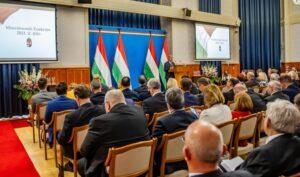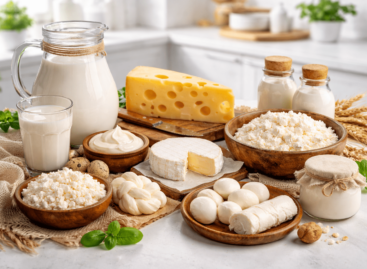Delivering domestic agricultural products abroad is a joint task
Sándor Farkas, Deputy Minister of the Ministry of Agriculture, gave information on the situation of Hungarian agriculture, the results of agricultural foreign trade and international cooperation, future ideas, and set goals to our country’s accredited mission leaders abroad.

(Photo: AM/Tibor Vermes)
In addition to maintaining and strengthening previous foreign market relations, the aim of the agricultural ministry is to promote new business relations and cooperation between domestic agricultural enterprises and foreign companies. At the event held at the Ministry of Foreign Affairs and Trade, Sándor Farkas asked for the help of the diplomats present. As he said, Hungary will provide an unprecedented amount of 80 percent additional national funding for the resources of the EU budget cycle until 2027. Thanks to this, large-scale investment programs were launched in 2021 and 2022, the transition years of the Common Agricultural Policy (KAP). Since 2021, more than 11,000 applications have received support exceeding HUF 1,452 billion in calls to support investments in the agricultural and food industry. Thus, we can have good hope that the food industry, including milk processing plants, meat plants, canneries, and cold stores, will be able to renew themselves with three times more resources than before. As a result of the developments, the food sector can create an exportable, highly processed commodity base. So there will be enough Hungarian products that can be sold abroad, he said.
Sándor Farkas spoke about two product areas, wheat and honey, in the context of outlining the difficulties faced by agriculture in the past year
These are priority areas of export development, and the Ministry of Agriculture counts on the help of foreign missions in this as well. He emphasized that the domestic beekeeping is now extremely in need of strengthening exports and reaching new markets, as the traditional sales channels are currently almost completely blocked due to the dumping of dubious quality honeys arriving in the European Union, which also lower the purchase prices by 30-40 percent.
In connection with the market disruptions in the grain trade, he mentioned that the improper operation of the solidarity corridors also significantly reduced grain prices
Following the joint action of the affected member states – Bulgaria, Poland, Hungary, Romania, Slovakia – the European Commission banned the entry of Ukrainian corn, wheat, sunflower and rapeseed on the market in the member states neighboring Ukraine from May 2023 until September 15, while still allowing transit shipments. In order to resolve the situation, Hungary, together with the other 4 member states, is putting pressure on the Commission to extend the measure until December 31, 2023. We also proposed that the EU provide financial support for transit transport costs. It is our common responsibility to ensure that Ukrainian agricultural products return to their traditional export markets and reach third countries in need. The Ministry of Agriculture will continue to rely on diplomats working abroad in the deepening of international cooperation, initiation and implementation of new ones in certain fields affecting agriculture, the deputy minister concluded his presentation.
AM
Related news
NAK President: more than 120 thousand people signed the agricultural petition in one month
🎧 Hallgasd a cikket: Lejátszás Szünet Folytatás Leállítás Nyelv: Auto…
Read more >Milk and dairy product prices decreased at the beginning of the year in Hungary
🎧 Hallgasd a cikket: Lejátszás Szünet Folytatás Leállítás Nyelv: Auto…
Read more >János Lázár: rural development is needed, not agricultural policy
🎧 Hallgasd a cikket: Lejátszás Szünet Folytatás Leállítás Nyelv: Auto…
Read more >







